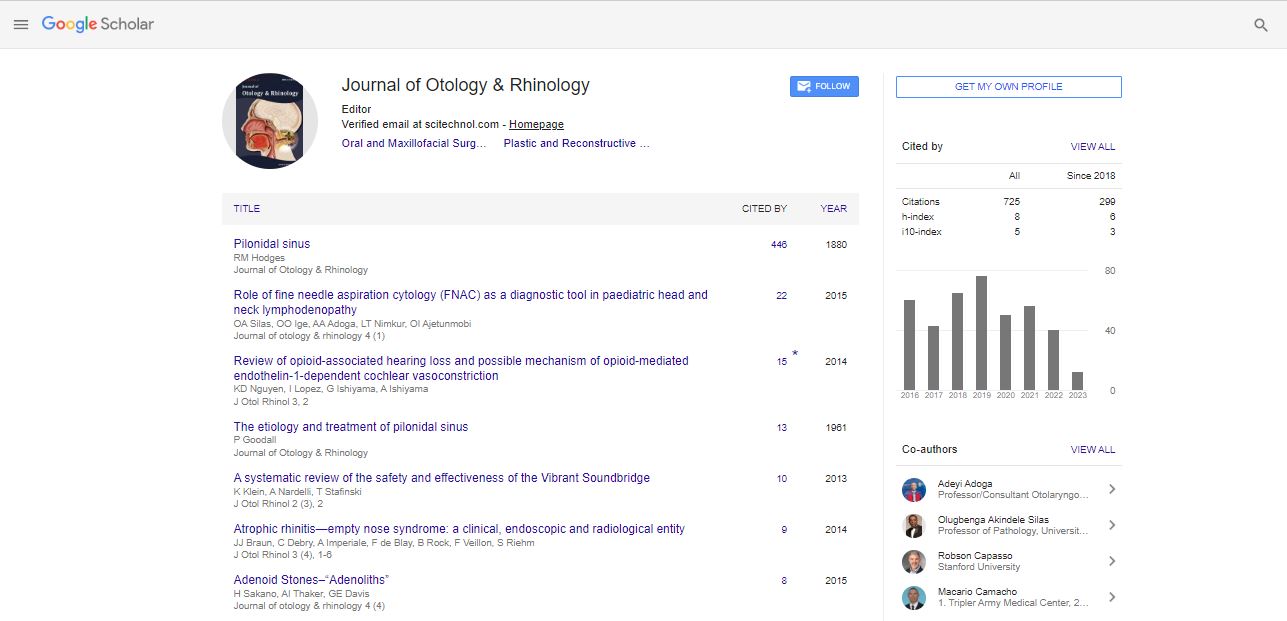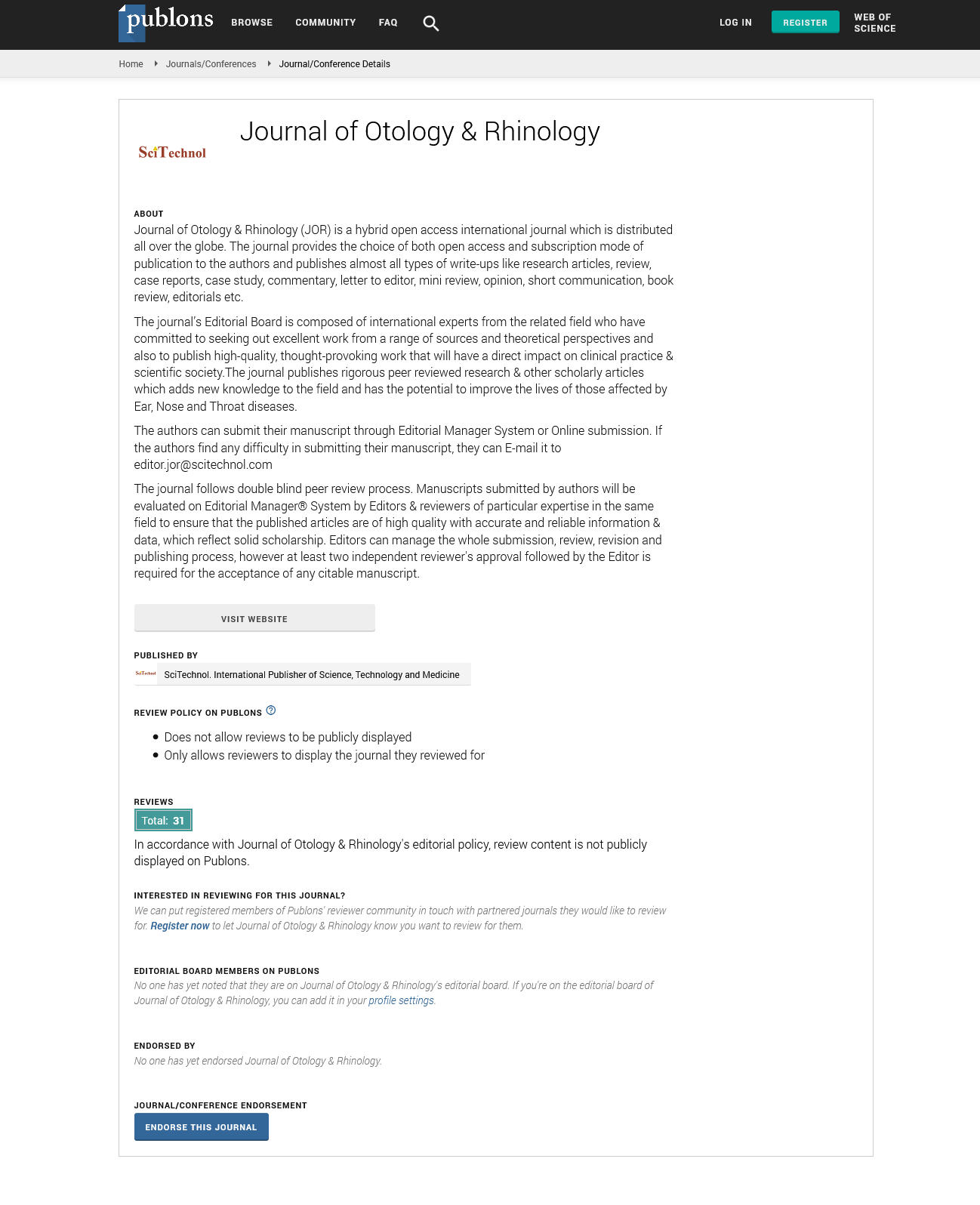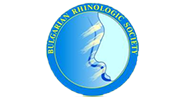Perspective, J Otol Rhinol Vol: 12 Issue: 2
Importance of Neurotology in Maintaining Vestibular Function
Sarah Vivas*
1Department of Otolaryngology, Emory University, Atlanta, USA
*Corresponding Author: Sarah Vivas
Department of Otolaryngology, Emory
University, Atlanta, USA
E-mail: vivassarah@gmail.com
Received date: 20 February, 2023, Manuscript No. JOR-23-92948;
Editor assigned date: 22 February, 2023, PreQC No. JOR-23-92948 (PQ);
Reviewed date: 08 March, 2023, QC No. JOR-23-92948;
Revised date: 15 March, 2023, Manuscript No. JOR-23-92948 (R);
Published date: 22 March, 2023, DOI: 10.4172/2324-8785.100041
Citation: Vivas S (2023) Importance of Neurotology in Maintaining Vestibular Function. J Otol Rhinol 12:2.
Description
Neurotology is a subspecialty of otolaryngology that deals with the diagnosis and management of disorders of the ear and nervous system. It involves the study of the anatomy, physiology, and pathology of the vestibular system, cochlea, and related neural pathways. Neurotologists are specialists who are trained to diagnose and treat a variety of conditions related to the ear and nervous system.
One of the primary functions of the ear is to maintain balance and spatial orientation. The vestibular system, located in the inner ear, is responsible for this function. The vestibular system consists of three semicircular canals and two otolith organs. The semicircular canals detect rotational movements of the head, while the otolith organs detect linear movements and changes in the position of the head with respect to gravity.
Disorders of the vestibular system can cause a variety of symptoms, including vertigo, dizziness, and balance problems. These symptoms can be caused by a variety of conditions, including Meniere's disease, Benign Paroxysmal Positional Vertigo (BPPV), vestibular neuritis, and acoustic neuroma.
Meniere's Disease
It is a condition characterized by recurrent episodes of vertigo, tinnitus, and hearing loss. The exact cause of Meniere's disease is not known, but it is thought to be related to changes in the fluid pressure in the inner ear. Treatment options for Meniere's disease include medication, dietary changes, and surgery.
BPPV is a condition characterized by brief episodes of vertigo that are triggered by changes in head position. It is caused by the displacement of small crystals in the inner ear. Treatment options for BPPV include a series of maneuvers that can help to reposition the crystals.
Vestibular neuritis is a condition characterized by acute onset of vertigo, nausea, and vomiting. It is caused by inflammation of the vestibular nerve. Treatment options for vestibular neuritis include medication and physical therapy. Acoustic neuroma is a benign tumor that arises from the vestibular nerve. It can cause hearing loss, tinnitus, and balance problems. Treatment options for acoustic neuroma include surgery, radiation therapy, and observation.
In addition to vestibular disorders, neurotologists also diagnose and treat conditions related to the cochlea, such as hearing loss and tinnitus. Hearing loss can be caused by a variety of factors, including noise exposure, aging, and genetic factors. Treatment options for hearing loss include hearing aids, cochlear implants, and boneanchored hearing devices.
Tinnitus
It is a condition characterized by ringing or other sounds in the ears that are not related to external stimuli. It can be caused by a variety of factors, including noise exposure, medication side effects, and ear infections. Treatment options for tinnitus include medication, cognitive behavioral therapy, and sound therapy.
Neurotologists work closely with audiologists, neurologists, and other specialists to provide comprehensive care to patients with ear and nervous system disorders. They use a variety of diagnostic tools, including vestibular function testing, audiometry, and imaging studies, to diagnose and treat these conditions.
Neurotology is a subspecialty of otolaryngology that focuses on the diagnosis and management of disorders of the ear and nervous system. Disorders of the vestibular system, cochlea, and related neural pathways can cause a variety of symptoms, including vertigo, hearing loss, and tinnitus. Neurotologists are trained to diagnose and treat these conditions using a variety of treatment options, including medication, surgery, and physical therapy.
 Spanish
Spanish  Chinese
Chinese  Russian
Russian  German
German  French
French  Japanese
Japanese  Portuguese
Portuguese  Hindi
Hindi 


